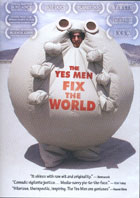
The Yes Men Fix the World 2009
Distributed by Bullfrog Films, PO Box 149, Oley, PA 19547; 800-543-FROG (3764)
Produced by Andy Bichlbaum and Mike Bonanno
Directed by Andy Bichlbaum and Mike Bonanno
DVD, color, 87 min.
Sr. High - Adult
American Studies, Bioethics, Business, Economics
Date Entered: 12/17/2009
Reviewed by Dan DiLandro, E.H. Butler Library, State University of New York College at BuffaloThrough self-filming, archival footage, and animations, The Yes Men Fix the World chronicles the exploits of the Yes Men, hoaxers or “culture jammers” who occasionally pose as spokespeople for global corporations, making pronouncements regarding the organizations’ intentions which are totally antithetical to those groups' actual goals. In posing as representatives of Dow Chemical, Halliburton, and the World Trade Organization, among others, the Yes Men promote and explain their ideas regarding free market economics and globalization in general and express how corporate greed works to hurt individuals in particular.
The film opens in Paris, where the Yes Men (Andy Bichlbaum and Mike Bonanno) are poised to scam BBC World News (and its 300 million viewers) into believing that Dow Chemical is assuming total responsibility and going to make restitution for the two-decades-past Bhopal, India, chemical disaster.
The Yes Men Fix the World, here and elsewhere, studies the history of the group, highlighting their various and widely-reported exploits, such as a London appearance as a Dow representative, where they unveiled a “risk acceptable calculator” and a golden skeleton that sought to prove the “calculation of human life…from a bottom-line business perspective.” Elsewhere, at a Canadian GO-EXPO Energy Conference, they (as “Exxon” officials) unveiled “vivoleum,” a putative biofuel that was created out of human flesh. Notably, this hoax included a video of “Reggie,” a comedian who was hired to play a dying Exxon janitor who volunteered his body for transformation into a vivoleum candle after his death.
Throughout these episodes, the Yes Men’s philosophies and motivations are successfully explored and explained: That the free market economy, as propounded by Milton Friedman and subsequently adopted by most industrialized nations’ leaders for the last 30 years, as well as globalization and an unrestricted economic market have led to an exponential devaluation of human life over the almighty dollar, as it were. Indeed, free market lobbyists and thinkers are interviewed; and their evidently skewed contentions regarding human life versus corporate revenue are interposed over a blue screen of scenes of and from Hurricane Katrina as well as Tom of Finland pieces (note that this last is from the somewhat silly assertion of one of these experts that “any image” that speaks to “free men” and “their desires…” be shown on the screen). This of course highlights the great fun the Yes Men have throughout the film, and it makes their somewhat overwhelming moral message easily accessible to audiences.
The Yes Men, though, especially and specifically target corporate and governmental reaction to both 2005’s Hurricane Katrina and its aftermath as well as the 1984 Bhopal chemical disaster in this film. Regarding Katrina, they attend a Gulf Coast Recovery Conference, finding at an exposition—which was staged ostensibly to discover and promote devices and science that would help avoid another such disaster—bomb detonation devices and other military applications available. Through this, though, they further examine the effects of the disappearing wetlands, how they contributed to the devastation, and how corporate greed was directly responsible for this. Their “Halliburton SurvivaBall” underscores the absurdity of corporate greed, but, again, helps to fully explain not only their motives, but just how distasteful high-financial institutions’ and bankers’ thoughts and motives can be.
Returning to the BBC hoax, they note how their proclamation that Dow Chemical was going to provide reparations for the Indian victims caused the Dow stock to plummet by 3.5% within hours.
There is a lot of important material and food for thought here. The Yes Men Fix the World is balanced in its narrative in that, upon hearing how Bhopal residents reacted first with joy, then with anger over their hoax, they travel there, and provide viewers the opportunity to see—and keep fresh in their minds—the site of that disaster itself and the knowledge that the contamination is still extant, how the suffering are still sick, and some facts regarding the overall disaster. Notably, none of the residents who were filmed comes across as truly angry, but they—like the filmmakers—profess gratitude that the scam refreshed their plight in the world’s consciousness.
This film is particularly satisfying in that some viewers might be somewhat aware of the existence of the Yes Men via their oft-reported hijinx, but The Yes Men Fix the World provides a fine narrative in which these sometimes-reported incidences are placed in a wider context of their global mission and can more fully explain why exactly they are pulling off these hoaxes over and over.
The film concludes with the knowledge that though they have not, in fact, fixed the world, they are reminding people what they can do and become, and showing how the world might actualize itself. Their final filmed hoax of a fake New York Times being spread across New York City and its citizens’ reactions to it provides a “nice” close to the narrative and also serves to wrap their message up well.
In short, while The Yes Men Fix the World can be a bit overly silly at times and their hoaxes are not always logistically completely successful, its message is clear and well-crafted -- whether viewers agree with its politics or not. It is an outstanding film and, thus, highly recommended for students of and collections interested in American studies, bioethics, business, and economics.
Awards
- DOC U! Award, Amsterdam International Documentary Film Festival, 2009
- Panorama Audience Award, Berlin International Film Festival, 2009